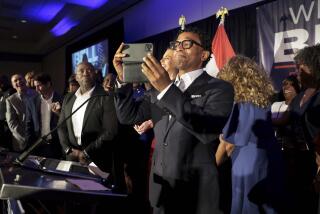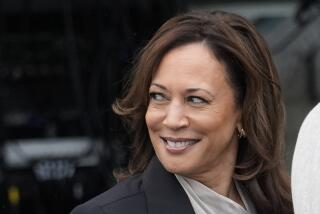Brown Captures Connecticut Race in Stunning Upset : Politics: Defeat of front-runner Clinton creates new uncertainty in the Democratic presidential contest. Bush again beats Buchanan, but protest vote lingers.
- Share via
WASHINGTON — Former California Gov. Edmund G. (Jerry) Brown Jr. scored a stunning upset over Arkansas Gov. Bill Clinton in the Connecticut primary Tuesday, engulfing the Democratic presidential race in a new wave of uncertainty.
Clinton’s loss came just days after the decision by former Sen. Paul E. Tsongas of Massachusetts to suspend his Democratic candidacy appeared to remove the last major hurdle the Arkansas governor faced to claiming his party’s nomination. But in another sign of apparent dissatisfaction with Clinton among Connecticut Democrats, Tsongas was running a surprisingly strong third.
With 90% of the vote counted, Brown had 38%, Clinton had 35% and Tsongas had 20%.
On the Republican side, President Bush again easily defeated challenger Patrick J. Buchanan. With 89% of the GOP vote counted, Bush had 67% and Buchanan had 22%. An uncommitted slate of delegates had 9% and former Ku Klux Klan leader David Duke had 2%.
Bush has won all of the Republican contests, but the fact that a third of the Connecticut Republicans did not vote for him--a repeat of results in several other states--continues to show that he has not completely quelled the discontent that initially fueled Buchanan’s candidacy.
In the Democratic race, the outcome seems likely to deal a serious setback to Clinton’s hopes of bringing the contest for the nomination to an early halt, uniting his party and focusing his fire on Bush.
Conversely, Brown’s win can be expected to give his insurgent campaign against the political Establishment a big boost heading into the New York and Wisconsin primaries on April 7.
Exit polling of Connecticut Democrats indicated that the character questions that have plagued Clinton’s candidacy were particularly troublesome to him in Connecticut.
Asked if they believed Clinton had the honesty and integrity to be President, 49% of those interviewed said yes, while nearly as many--46%--said no. A majority of the latter group voted for Brown.
The polling, conducted for the major television networks, indicated that if Tsongas had stayed in the race he might have won, with 41% of those interviewed saying they would have voted for him if he had still been an active candidate.
Connecticut’s Democratic campaign over the last month paralleled the changing course of the national struggle among the contenders.
Tsongas, propelled by his victory in the Feb. 18 New Hampshire primary and aided by his New England roots, moved into a 2-1 lead over Clinton in statewide polls, with Brown a distant third.
But the tide began to turn as Clinton racked up victory after victory in the Southern primaries that dominated early March. And his sweep last week of the Illinois and Michigan primaries--the first major contests on neutral ground--caused Connecticut Democratic leaders to rate their race a toss-up, with the trend running in Clinton’s direction.
When Tsongas, citing his campaign’s shortage of money, suspended his candidacy last Thursday, the road seemed clear for a big Clinton victory in Connecticut that would give him momentum heading into New York and Wisconsin.
But Brown, whose advisers had been urging him to concentrate on those two states, decided to take on Clinton in Connecticut.
He continued to bid for blue-collar votes--a strategy that had paid off in a second-place finish in Michigan--and was rewarded with the support of several local labor unions in Connecticut.
He hammered at Clinton for playing a round of golf last week at an all-white country club in Little Rock, Ark., saying it raised questions about the governor’s judgment. He said Clinton should explain to the black voters “why he’s at a club playing golf where they can’t.”
Clinton pledged not to play at the club again until it is integrated.
Brown also aired a television commercial in Connecticut that stressed his theme that voters should reject the forecasts that Tsongas’ departure from the race established Clinton as the presumptive Democratic nominee.
Clinton countered with a commercial that derided Brown’s proposal for a flat 13% income-tax rate, the centerpiece of his economic program. The ad blasted the plan as “a flat-out fraud.”
Both in the commercial and on the stump, Clinton also accused Brown of hypocrisy in his current emphasis on campaign finance reform. Clinton noted that Brown, while he serving as chairman of the California Democratic Party in 1990, helped lead the fight against an initiative imposing a $1,000 limit on individual contributions to candidates for state office. The initiative ultimately was ruled unconstitutional.
Some of Tsongas’ Connecticut supporters, meanwhile, refused to accept their candidate’s decision to suspend his campaign and continued their efforts on his behalf.
Without much money but with plenty of zeal, they deployed their volunteers to New York’s Grand Central Station to solicit backing from commuters. They even called a “summit conference” of Tsongas campaign leaders from other states, urging them to carry on the fight.
Nick Carbone, director of Tsongas’ Connecticut operation, vowed to take the campaign and Tsongas’ message of economic revival through “hard choices” to the floor of July’s Democratic convention in New York.
The battle among the Republicans never was joined. Buchanan, running short of funds and conceding that Bush is headed toward renomination, spent just six hours campaigning in Connecticut last weekend, and he did not air any television or radio commercials there.
A spokesman for Buchanan, Chris Tremblay, said Tuesday night that the campaign took pride in his showing and in the number of votes cast against Bush in the state in which the President grew up and which his father represented in the Senate.
The underlying issue in both campaigns was the economy. The bite of the prolonged recession cut across the state’s economic base, hurting real estate, banking and the insurance industry. Particularly hard hit was was the defense industry, with United Technologies Corp., the state’s largest employer, recently announcing layoffs of about 6,000 workers.
More bad news came only last week when Bush announced plans to stop building the $2.3-billion Seawolf submarine in Groton, Conn.
General Dynamics Corp.--builder of the Seawolf and the second largest employer in Connecticut--had already laid off about 1,600 shipyard workers in the past 21 months and plans to let another 2,200 go next month.
Bush’s announcement created an opening for Clinton to stress his support for construction of at least one more Seawolf to keep the Groton facility open until the next generation of nuclear subs, the Centurion, is needed. Campaigning at Groton, and denying charges of playing up to the Seawolf workers, Clinton called for a comprehensive national economic policy to help defense workers find other employment.
Brown opposes continued production of the Seawolf, but he favors a plan for smoothing conversion of defense plants into other types of manufacturing.
Faced with criticism from Clinton and Buchanan, who also backs continued production of the Seawolf, Bush defended his position in television interviews broadcast in Connecticut on election eve.
“I want to cut the defense budget by $50 billion,” Bush said. “Yet what you’re hearing from the other side is ‘$50 (billion) is not enough, let’s cut it by $100 (billion).’ ”
Said Bush: “It’s a tough call when you have to shut something down, but that’s what a President has to do.”
More to Read
Get the L.A. Times Politics newsletter
Deeply reported insights into legislation, politics and policy from Sacramento, Washington and beyond. In your inbox twice per week.
You may occasionally receive promotional content from the Los Angeles Times.










